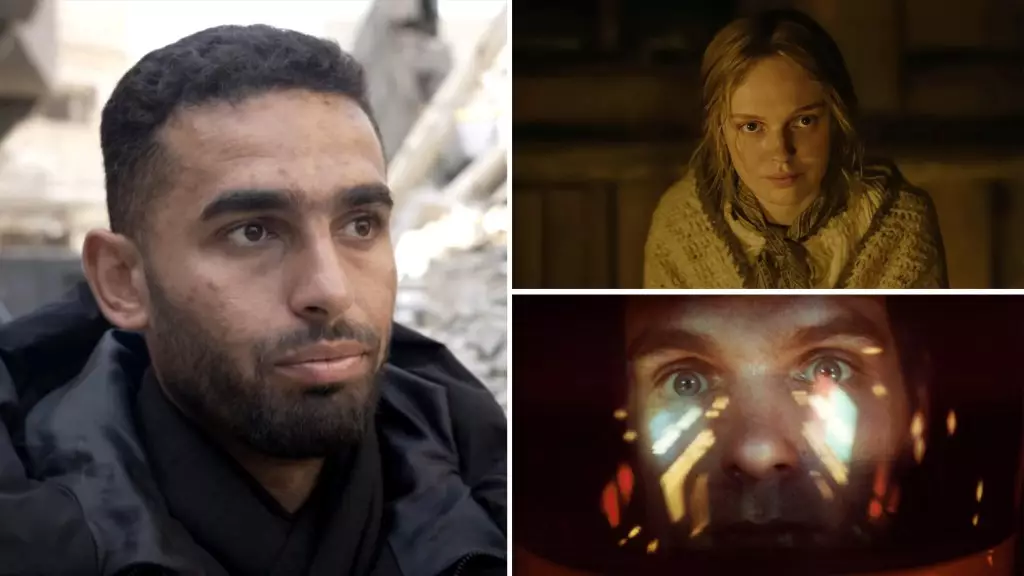As the film industry gears up for the annual awards season, a significant entry has emerged from an unexpected source—the Palestinian film “From Ground Zero.” This documentary, which has gained recognition on the Oscar shortlist for Best International Feature, offers a rare perspective into life in Gaza amidst conflict. Set to debut this weekend across 70 AMC locations and select arthouse theaters, including iconic venues like the Quad in New York City and Laemmle Royal in Los Angeles, the film invites viewers to witness the ordinary amid chaos through a series of poignant video diaries.
“From Ground Zero,” directed by Palestinian filmmaker Rashid Masharawi, is a collection of 22 video diaries that present a candid look at the day-to-day struggles faced by those living in Gaza. The film intentionally steers clear of overt political commentary, instead focusing on the resilient spirit of families trying to survive under the specter of violence. Masharawi, originally from Gaza and now residing in France, has initiated a fund to support filmmakers in the region during these tumultuous times, underscoring the need for creative expression even amid adversity.
The film’s narrative emerges from real-life experiences, providing a lens through which audiences can perceive the nuances of life under siege. Critics have praised “From Ground Zero” for its authenticity, and it currently boasts a commendable rating of 93% on Rotten Tomatoes, indicative of its resonating impact among audiences and critics alike. In a market flooded with both independent and mainstream cinema, the film’s launch reflects a significant cultural moment as it attempts to carve out space for stories of resilience alongside the multitude of narratives vying for attention.
The opening of “From Ground Zero” is emblematic of the changing dynamics within film distribution, particularly for projects that tackle sensitive subjects. Executives at MPI Media, which backs the film, took a gamble by scheduling its release soon after Oscar shortlists were announced, securing a strategic placement in theaters catering to both mainstream and niche audiences. With AMC’s willingness to collaborate with smaller productions, the film’s availability in key demographic markets, especially where Palestinian communities are prominent, highlights a broader conversation about representation in cinema.
This venture not only lights a candle in the darkness of war-torn narratives but also reflects a concerted effort to bring diverse voices to the forefront, showcasing human stories that often go overlooked. As the countdown to Oscar voting begins, “From Ground Zero” symbolizes hope and the unyielding desire for expression that defines the art of filmmaking.
In a marked contrast to the poignant realism of “From Ground Zero,” horror-thriller “The Damned” emerges as a chilling narrative set in 19th-century Iceland. Directed by Thordur Palsson, this film explores the moral dilemmas faced by a community during a winter crisis—a shipwreck that forces residents to weigh their survival against the fate of the wrecked crew. The story blends elements of psychological tension and community ethics, ultimately probing the human capacity for empathy and guilt in times of desperation.
The film’s timely release during the awards season adds another layer of complexity to the cinematic landscape. With a 84% rating on Rotten Tomatoes, “The Damned” stands as a testament to the diverse storytelling that thrives within the current cinematic climate, appealing to audiences drawn to both horror and historical intrigue.
In parallel, the exploration of artificial intelligence in films also takes center stage, particularly through a retrospective program hosted by NYC’s Film Forum. Titled “From Metropolis to Ex Machina,” this series delves into the portrayal of AI in cinema—showcasing how filmmakers have grappled with the concept of machines taking on human-like traits and the ethical implications that arise from such advancements. This retrospective signifies an ongoing conversation about technology’s role in shaping our lives, a theme that resonates profoundly in an age where AI’s influence is becoming increasingly prevalent.
Ultimately, both “From Ground Zero” and the exploration of AI in film encapsulate the dual nature of cinematic storytelling—one that reflects societal struggles and another that engages audiences with speculative futures. As the industry prepares to honor excellence in filmmaking, it is essential to recognize the breadth of narratives offered. From tales of survival in conflict zones to ethical quandaries regarding technological advancement, films continue to be a powerful medium through which we understand and confront the complexities of the human experience.
As audiences tune in to the evolving narratives unfolding on screen, they are not merely passive viewers; they become participants in a larger discourse that shapes cultural understanding and empathy. The intersections of human resilience, moral dilemmas, and technological queries suggest that film is far more than entertainment—it is a vital reflection of our times.

